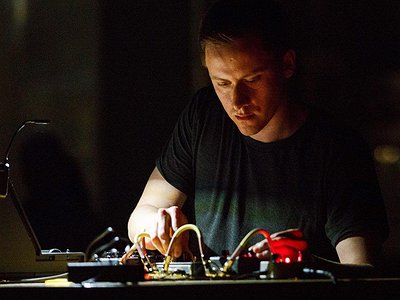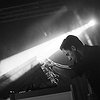Part 2
Could you describe your creative process on the basis of a piece or album that's particularly dear to you, please? Where did the ideas come from, how were they transformed in your mind, what did you start with and how do you refine these beginnings into the finished work of art?
"Rainbow Folding" from the Iridescent LP came to life as an exploration of my modular system’s polyphonic capabilities. It was recorded in one take without any further edits, just some EQ and compression. Polyphonic texture does something to me that I can’t put into words easily. Ockeghem, Gesualdo, Monteverdi, Palestrina and many other composers from the Ars Nova to Baroque era have been among my favorites for a long time. So, understandably, I took interest in what a modular system can offer in terms of polyphony. "Rainbow Folding" has two independent voices, a slow bass ostinato and a ‘ghost voice’ produced by a pitch shifting delay. It’s not a composition in a traditional sense since it wasn’t composed, it’s a patch (a recording of a patch) — a certain way the modules are connected in a modular system. So any refinement of traditional composition, like layering, edits, are applied to the patch itself. When it was done, I recorded several performances live and chose the one that I liked the best.
In general, even when it comes to traditional music composition, I always start with the sound first, never ideas or conceptions. Phenomenology first, ha ha.
There are many descriptions of the ideal state of mind for being creative. What is it like for you? What supports this ideal state of mind and what are distractions? Are there strategies to enter into this state more easily?
I don’t think I buy the whole ‘creativity’ thing. Making music is not much different from taking a shower or reading a book or any other practice. Of course, if you’re concentrating on a certain process, you wouldn’t want anything to distract you from it. If you take a shower, you wouldn’t want water to stop running unexpectedly, if you sleep, you wouldn’t want someone to scream into your ear. But that’s just about it — to me there’s no such thing as a creative state of mind.
I’m not a fan of blaming gadgets and contemporary “fast” lifestyle either. It’s how the world is and it will become, probably, even faster with even more petty distractions. You have to adapt your practice. If you are constantly in a state of conflict, feel nervous about stuff distracting you from your magnum opus or you’re angry with the listeners who don’t listen to music “like they used to”, with albums on repeat for days and other ressentiments like that, maybe it’s not the world that is wrong. It’s not like the world doesn’t offer new media that are appropriate for contemporary consumption practices. Instagram, Youtube, they’re all here. You don’t have to write records that would fit the length of Beethoven’s 9th anymore, a one minute short Instagram video or Spotify single are as good.
How is playing live and writing music in the studio connected? What do you achieve and draw from each experience personally? How do you see the relationship between improvisation and composition in this regard?
Right now, technically there’s almost no difference between playing live and writing music in the studio for me (except for commercial music). I have the same process that boils down to a performance on a modular system. Five years ago or so I used to play pre-recorded compositions live, with some additional effects or rearrangements in Ableton. While it definitely worked just fine, with time I realised that I don’t really feel much when I’m playing them, especially if I compare the states I experienced when I composed these tracks. So I felt like I was lying both to myself and my audience. Since most of my music is about states, and it’s really important to me to have this experience during the live show. So I gradually switched to improvised live sets. This process has its own problems, like, for example, not finding a connection with the sound during the live set at all, resulting in an inability to make decision about the development of the sound, resulting in a total disaster. But when everything goes well and it clicks it’s a pure bliss. It’s worth it.
How do you see the relationship between the 'sound' aspects of music and the 'composition' aspects? How do you work with sound and timbre to meet certain production ideas and in which way can certain sounds already take on compositional qualities?
In my musical practice, the form (composition) is almost always derived from the material (sound). The relationship between the sound and composition is ouroboric, we can talk about it until the end of times, I think.
Our sense of hearing shares intriguing connections to other senses. From your experience, what are some of the most inspiring overlaps between different senses - and what do they tell us about the way our senses work? What happens to sound at its outermost borders?
Instead of a direct answer to your question, I’ll share two personal experiences.
The first one happened in the Tate Modern, in a Mark Rothko room. I’d never seen Rothko’s works in person before, but he’s been my favorite visual artist for quite a long time. So when I came to London I went to Tate as soon as I could. I arrived to the Rothko hall after I saw the whole exhibition, three hours maybe, or so, very tired. And I spent about 30 minutes in the room, absolutely transfixed. It was a very quiet room and felt more like a church than art gallery. I walked around slowly, in circles, and after some time I suddenly realised that I hear music. Very, very quiet, barely audible sound. At first I thought they had speakers in the room, hidden somewhere (they could’ve played Feldman’s Rothko Chapel). So I started looking for hidden speakers, I did a few circles around the room but couldn’t find any no matter how attentive I was. While I was walking the music achieved a flickering quality, like it was going in and out of existence. I thought maybe I’m just tired and hearing things, but when I paid close attention to the sound I could discern more details. I even thought of asking other visitors whether they hear it or now, but didn’t do it in fear of looking like a crazy guy. I simply couldn’t get the nature of this sound. It felt like it lived on the borders of existence, flickering. It was a very powerful feeling. Fragile and tender and powerful and awe-inspiring at the same time. As if sublime and its inverse were experienced at the same time. Pure magic. I still don’t know what was the true nature of this sound, Maybe there was some acoustic leakage from other rooms, or maybe it was indeed an auditory hallucination, but it’s not really important. It was the first time I experienced liminality, something that flickers on the edge of existence. And it had a huge influence on my musical and listening practices.
The second one happened during a medical procedure. I was diagnosed with SSHL this July — suddenly lost hearing in my right ear. The standard treatment plan for this condition is a corticosteroid therapy. You take them for one-two weeks and if they don’t help they might do the intratympanic steroid injection — injecting steroid in your ear through your eardrum. The initial treatment didn’t help, so they did several injections. In my case all I heard in my right ear was tinnitus and some sub low and ultra high frequencies. But during the injection, after the liquid hit the middle ear, there was this fantastic burst of sine waves. They moved in harmonic series, up and down and skipped to weird intervals, getting louder and softer, resulting in a harmonic orgy. This audio experience was combined with the feeling of intense vertigo caused by liquid in the middle ear. But the most impactful part was a realisation that this is an inaudible experience of music, it can neither be recorded nor reproduced and I’m the only person who’s experiencing it.
Art can be a purpose in its own right, but it can also directly feed back into everyday life, take on a social and political role and lead to more engagement. Can you describe your approach to art and being an artist?
I have no particular approach to art or to being an artist. I’m interested in political and social topics, but ignore it in my own art. There’s nothing wrong with it, it’s simply something that doesn’t drive me at the moment.
It is remarkable, in a way, that we have arrived in the 21st century with the basic concept of music still intact. Do you have a vision of music, an idea of what music could be beyond its current form?
I’m afraid I can’t agree. The emancipation of all sounds, new modes of listening and music production, exploration of phenomenology of sound, radical changes in the politics of noise, emergence of sound art and many other things. What music is today is radically different from what music has been a century ago. It even moves further currently, dissociating itself from the sound as a physical phenomenon, with the help of interdisciplinary projects and such discourses as inner listening, memory etc.






